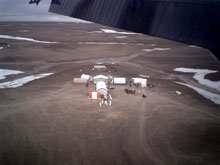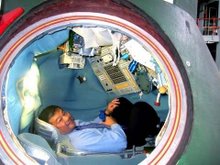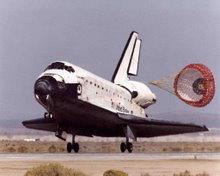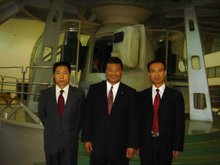US Policy on access to Low Earth Orbit (LEO) is on the edge of a dramatic shift. Currently, only three governments have the independent capability of launching astronauts into LEO: The United States, Russia and China. After the US Space Shuttle is decommissioned from service, there will be only two. The Review of US Human Spaceflight Plans Committee, headed by the highly respected former aerospace executive, Norm Augustine, included in their report, the option of stimulating commercial efforts to provide access to LEO. It makes sense: We have been flying to LEO for almost fifty years, so the technology is quite mature and available. The challenge is to make this a commercial practicality.
The idea of private, commercial space access has been around for decades. It is not a new one, and it is not one that has yet found success. The advent of SpaceShip One winning the Ansari X-prize in 2004, was an important milestone. Although the privately built vehicle was only designed for suborbital flight, it proved that a non-government spacecraft was possible. Commercial orbital flight will be much more difficult, but I believe it is possible.
Many of my colleagues and peers have written articles and pieces, deriding the idea of commercial LEO access. Indeed, the track record of the self-described “New Space” companies has thus far, been marked generally with failure and arrogance. Not all, but many of these folks, before they run their companies into the ground, seem to spend the bulk of their time attending self-serving, self-aggrandizing conferences where openly slinging mud at NASA is sport. This is hardly constructive, and it brings discredit to others who have serious aspirations for the future of commercial spaceflight.
However, I respectfully disagree with my colleagues who believe that only governments can and should engage in human spaceflight. We members of the Augustine Commission (as the review committee came to be known) fully intended for the commercial LEO efforts to include contributions from the traditional aerospace companies. These companies, or their predecessors, built every US crewed spacecraft to date. They have much to offer. To exclude them entirely would be foolish and valuable knowledge wasted.
The time is right for commercial human spaceflight. Private companies should learn the lessons from NASA and traditional aerospace, and then try to apply them in a more efficient manner. It is understandable how and why the processes for government/contractor space programs have evolved into what they are today: Bureaucratic and inefficient, but safe. The key is to work in a smart manner to provide efficiency, without sacrificing safety, perhaps in partnership with traditional aerospace companies.
Anytime there is significant change in the air, the establishment gets nervous. This is to be expected. Sometimes dramatic change is necessary to achieve fresh results. Time will tell if the private companies will achieve LEO access, but I for one, remain optimistic. Americans have always been innovative, flexible and doggedly determined. If it can be done, the citizens of the US still embody the creativity and courage to find the way.
Leroy Chiao
Devon Island Expedition

This blog features educational updates on my Devon Island Expedition of July 14-20, 2007. Other sites: spaceref.com/blogs/earthclassroom, www.marsonearth.org

Thursday, February 4, 2010
Subscribe to:
Post Comments (Atom)





2 comments:
RABBIT-NOW FOR FUN AND ENTERTAINMENT
Hello Everyone,
Check out recent tips to make your research publishable at IEEE Aerospace Conference at IEEE Paper Tips
Similarly, we also tips to get your paper selected at 2023 AIAA SciTech Forum.
Read Out AIAA Paper Tips
Post a Comment